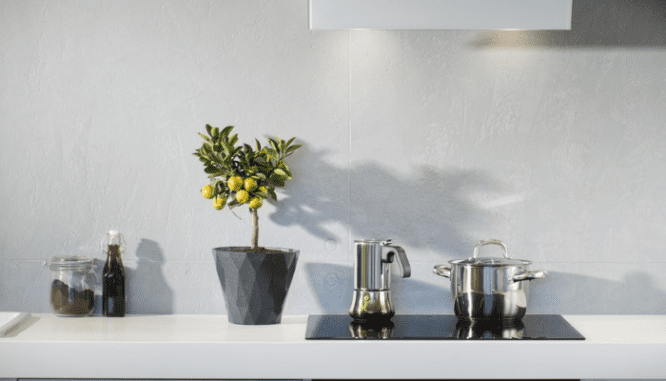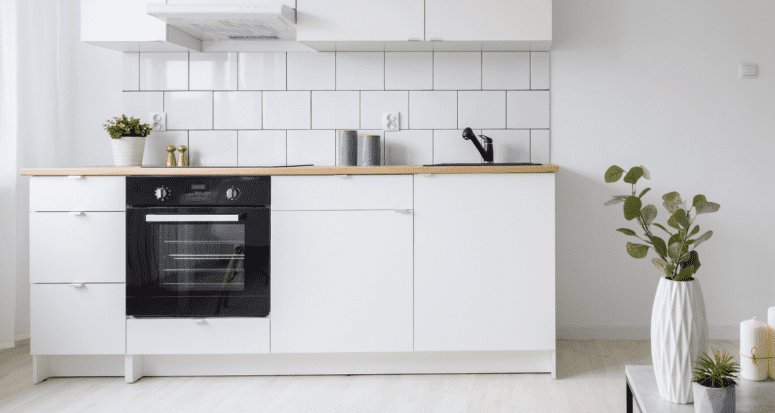Kitchenette Trends in Real Estate: Prime for Takeout and the Luxury Market
- Published on
- 4-5 min read
-
 Valerie Kalfrin Contributing AuthorClose
Valerie Kalfrin Contributing AuthorClose Valerie Kalfrin Contributing Author
Valerie Kalfrin Contributing AuthorValerie Kalfrin is a multiple award-winning journalist, film and fiction fan, and creative storyteller with a knack for detailed, engaging stories.
If you’ve seen a listing that advertises a kitchenette, you might wonder if that’s a perk or just a cute way to describe a kitchen.
By definition, a kitchenette is a small kitchen, or an alcove equipped with cooking facilities. Industry experts like real estate agents describe it another way: a small area for preparing light meals and lacking full-size appliances, typically a stove.
Regardless, it’s a smart use of space in a home where someone doesn’t use an oven all that much; popular in tiny house plans; and a way to convert a basement or other addition in a single-family home into a guest suite.
“When you find a kitchenette at a single-family residence that has a standard kitchen in it already, 98% of the time, it’s in an area of the home where your 22- or 24-year-old is still living at home, or your mother-in-law’s living with you, or you’ve got some extended guests,” says Daryl B. Hanna, a top Las Vegas real estate agent who’s sold properties with kitchenettes, from high-rise condos along the Strip to single-family homes.
“That way, at eight o’clock, if they want to make coffee … they don’t have to come into the kitchen and bother the rest of the house.”
Let’s cook up some ideas about what makes a kitchenette appealing, plus how to make it work in your home.

Kitchens vs. kitchenettes: What’s the difference?
Although the average size of a kitchen in a newly built single-family home in the United States is 161 square feet, a kitchenette has no specific size. Rather, the key difference between a kitchen and a kitchenette is the appliances — both the types it has and their sizes.
A kitchenette typically has:
- A mini fridge
- A sink
- A storage cabinet or shelves
- Some type of cooking appliance, whether a mini stove, a two-burner cooktop, a microwave, or outlets for people to plug in a toaster or coffeemaker
Some appliance companies sell a “combination kitchen” or “compact kitchen,” an entire unit that’s essentially a kitchenette, said Rita Shaw, a real estate agent of about 40 years who is also a licensed contractor in the San Bernardino, California, area.
For instance, AJ Madison sells a 60-inch wide “combination kitchen” with a 5.1-cubic-foot refrigerator, a storage cabinet, stainless-steel sink and countertop, and dual electric burner for about $2,200.
For about the same price, Acme has a “full-feature kitchenette” that’s 51 inches wide, including a 4.3-cubic-foot refrigerator and a four-burner gas cooktop and oven.
“That’s everything you need for making coffee, or you could have a toaster or probably put a microwave in there,” Shaw said. “You don’t always want to sit down and have a whole meal. Maybe you just want a bowl of cereal.… But you’re not going to cook a turkey in the oven.”

Where you’ll see kitchenettes: tiny homes, luxury homes, and bonus rooms
Kitchenettes tend to turn up in smaller-size housing that appeals to seniors, college and graduate students, and others keener on heating up ready-made dishes from Whole Foods and Trader Joe’s than imitating a Food Network entree from scratch.
People who downsize to a tiny house, such as those featured in plans from the company Tiny Home Builders, might enjoy a kitchenette, such as the simple one in this model of a retirement home within a trailer that’s all of 20 feet long. It has room for a refrigerator, freezer, microwave, toaster oven, and coffeemaker, plus a small sink, countertop, and cabinets.
On the grander end of the spectrum, larger and luxury homes will advertise a kitchenette as a feature for guests or multi-generational living. For instance, this 4,300-square-foot house in the Detroit, Michigan, area, has a kitchen-dining area on the main floor with a breakfast bar, kitchen island, and two sinks — plus a guest suite with kitchenette on the second floor.
A bonus room — a multipurpose area without a closet, such as a den or family room — has even more perks with a kitchenette. For instance, this upstairs home library has DIY shelving and comfortable seating, but a kitchenette with a small fridge, sink, and selection of warm drinks practically invites people to curl up with a good read.
Medford Design-Build, a Texas luxury remodeling service serving Tarrant County since 1982, transformed another bonus room into a home office and loft space for a homeowners’ teens to hang out and watch TV.
The space included a guest bathroom and kitchenette. Because the two-burner cooktop hadn’t been used often, the design team removed it and the vent hood to provide more counter space. This kitchenette now contains cabinets, a mosaic tile backsplash, a sink, and a mini fridge.
Kitchenette considerations: Cleanup and building codes
Because of its small footprint, a kitchenette means easier cleanup — fewer countertops to wipe, and not much space for dirty dishes. So if you’re not big on entertaining, or if you’d like your guests to tend to themselves, a kitchenette dials down the stress.
That said, if you’d like to add a kitchenette to your property in the future, you’ll want to be sure that it follows building codes for ventilation and drainage. A lot of kitchenettes don’t have proper stoves, just cooktops, because a stove needs to vent, Hanna said.
“Every building department is different,” Shaw added. “If you’re in a basement, the building department might want a ventilation fan.”
A good licensed contractor will know what your local building codes are and what a kitchenette requires, such as adequate access to electricity and water, as well as how the sink will drain, she said.

7 ways to make your kitchenette work
If you end up buying a house with a kitchenette as your main kitchen because of budget restraints, or if the house you purchase has a kitchenette in a multipurpose or guest area, you’ll need to think simplicity to avoid clutter. Aim for minimal gadgets and gear — especially plates, glasses, pans, and cutlery.
Also consider your lifestyle and the purpose of the kitchenette to accent it with small appliances. Coffee lovers might want a French press or a single-serve coffeemaker, for instance.
RENTCafé, a nationwide listing service for rentals, recommends an electric kettle, which boils water about three times faster than a hot plate or a microwave, for making coffee, tea, hot cereal, and instant soups, as well as a food steamer to prepare healthy recipes fast.
Because a kitchenette doesn’t have the storage of a full-size kitchen, decorators suggest various ways to maximize the space:
- Shelves are a must, especially if your kitchenette has little or no cabinetry. Look for ones that serve several purposes, such as this Kungsfors combination from IKEA, which combines a shelf with a dish rack and a rail for hanging cup hooks.
- Speaking of shelves, once you pare down your kitchen items, don’t be shy about storing them in the open. Clear glasses and textured bowls and plates make for an attractive vignette.
- Instead of a knife block or storing utensils you use frequently in a drawer, hang a magnetic knife bar, such as this one from Modern Innovations, on the wall to hold not just knives but a whisk or spatula.
- If you have the ceiling space, use a hanging rack for any cookware to save cabinet space for food. Try the Old Dutch Graphite Oval Pot Rack, which includes 12 hanging hooks and a heavy gauge, powder-coat finish, or the Cooks Standard Wooden Wall Mounted Pot Rack, which includes hooks for hanging cookware beneath a wall shelf.
- If you have cabinets, store any lesser-used tools in matching wicker baskets or airy wire baskets in the gap between the top of the cabinets and the ceiling.
- If you’re able to modify the countertops or cabinets, you can build a slide-out prep station with a butcher-block board inside a drawer, complete with a hole that lines up with the trash can. Or consider an over-the-sink cutting board such as this one from Good Cooking that includes a removable collapsible silicone colander.
- Not that handy? If the floor space allows, you might invest in a rolling kitchen cart to create an island of extra storage and counter space.
- IKEA’s Stenstorp cart in white and oak has two adjustable shelves, a drawer, and a drop leaf.
- For a more industrial look, consider the Origami Foldable Rolling Kitchen Island Cart with wood top and storage shelves, or boost your cabinet and counter space with the Hodedah Kitchen Island, which includes a drawer, two doors, a spice rack, and towel rack.
Overall, a kitchenette is a petite amenity that can boost the appeal of a bonus room, provide guests with the ability to help themselves to light meals and refreshments, or serve as the main kitchen for someone not into cooking for a crowd.
That said, if you’re searching for your next home in a warm climate, you might find a kitchenette the perfect complement to a laid-back lifestyle where you do most of your cooking outdoors. “A lot of people put barbecues on the patio,” Hanna said. “That can become your stove as well.”
Header Image Source: (Dariusz Jarzabek/ Shutterstock)
